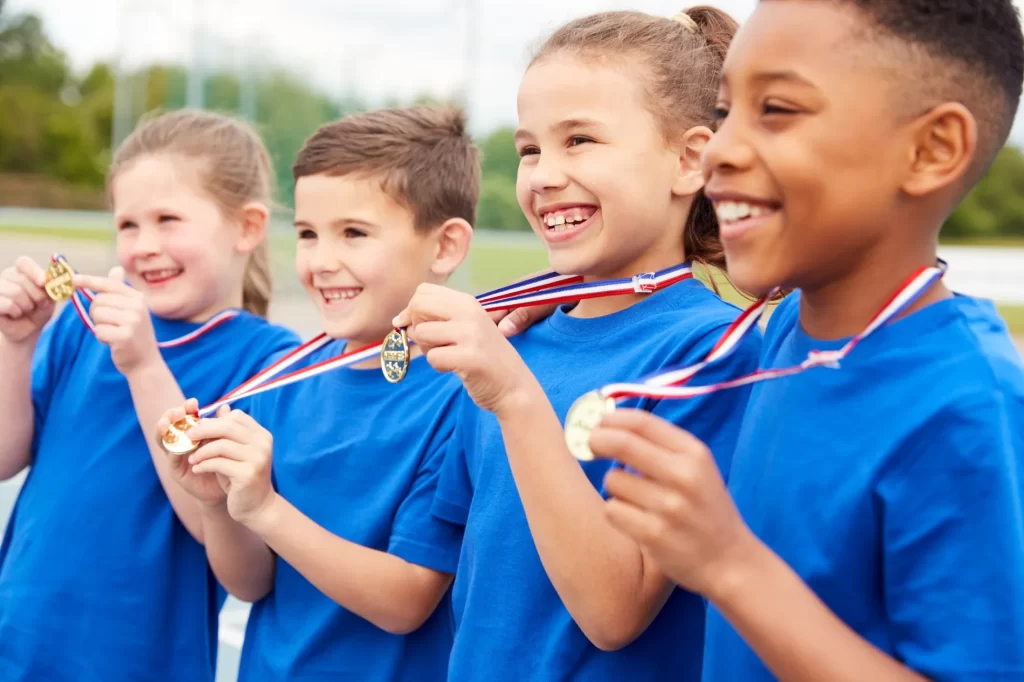
How Awards Affect Young Athletes Psychology: Understanding the Impact on Development
03/10/2025
The relationship between awards and young athletes’ psychological development represents one of the most debated topics in youth sports today. As participation in organised sports continues to grow across Australia, understanding how recognition affects children’s motivation, self-esteem, and long-term athletic engagement becomes increasingly important for parents, coaches, and sports administrators.
Research consistently demonstrates that awards and recognition significantly influence young athletes’ psychological development, but the effects vary dramatically based on implementation, timing, and individual characteristics. When designed thoughtfully, recognition programs can foster intrinsic motivation, build confidence, and encourage continued participation. However, poorly structured award systems may inadvertently create pressure, diminish enjoyment, or establish unhealthy competitive dynamics.
The psychological impact of awards extends far beyond the immediate moment of recognition. These experiences shape how children view achievement, effort, and their own capabilities, creating lasting impressions that influence their relationship with sports and competition throughout their lives.
The Science Behind Youth Sports Motivation Through Recognition
Understanding how recognition affects young athletes requires examining the fundamental psychological principles that drive motivation and behaviour in children. The brain’s reward system responds powerfully to acknowledgment, particularly during the formative years when neural pathways are still developing.
When young athletes receive recognition, their brains release dopamine, a neurotransmitter associated with pleasure and reward. This neurochemical response creates positive associations with the recognised behaviour, making children more likely to repeat actions that led to acknowledgment. However, the timing and nature of this recognition significantly influence whether it promotes healthy development or creates dependency on external validation.
Research in developmental psychology reveals that children’s motivation systems operate differently from adults. Young athletes are particularly sensitive to social feedback and peer recognition, making the context of award presentation crucial for psychological impact. Public recognition can boost confidence and social status, whilst private acknowledgment might better serve children who prefer less attention.
The concept of intrinsic versus extrinsic motivation becomes particularly relevant in youth sports recognition. Intrinsic motivation stems from internal satisfaction and enjoyment of the activity itself, whilst extrinsic motivation relies on external rewards and recognition. Effective award systems aim to support intrinsic motivation rather than replace it, using recognition to reinforce the joy and satisfaction that comes from participation and improvement.
Age-appropriate motivation strategies must consider cognitive development stages. Younger children (ages 5-8) respond well to immediate, tangible recognition that celebrates effort and participation. As children mature (ages 9-12), they begin understanding more complex achievement concepts and can appreciate recognition for skill development and teamwork. Adolescent athletes (13+) require recognition systems that acknowledge both individual achievement and contribution to team success.
Understanding Children’s Self Esteem and Trophies Connection
The relationship between recognition and self-esteem in young athletes presents both opportunities and challenges for healthy development. Self-esteem, defined as one’s overall sense of personal worth and competence, significantly influences how children approach challenges, handle setbacks, and view their capabilities.
Quality recognition programs can positively impact self-esteem by acknowledging effort, improvement, and character development alongside achievement. When children receive sports medals Queensland programs that celebrate diverse contributions, they develop more comprehensive views of their worth and capabilities.
However, the connection between trophies and self-esteem isn’t automatically positive. Recognition that focuses solely on winning or natural talent can create fragile self-esteem dependent on external validation. Children who receive awards primarily for outcomes they cannot fully control may develop anxiety about future performance and fear of disappointing others.
Research indicates that meaningful recognition should acknowledge specific behaviours and efforts rather than general praise. Instead of “great job,” effective recognition might say “your consistent practice on passing accuracy really showed in today’s game.” This specificity helps children understand exactly what behaviours led to recognition, making the feedback more valuable for future development.
The timing of recognition also influences its impact on self-esteem. Immediate acknowledgment of positive behaviours reinforces the connection between action and recognition, whilst delayed recognition may lose its psychological impact. However, some research suggests that intermittent recognition can be more powerful than constant praise, as it maintains the element of surprise and prevents children from becoming dependent on continuous validation.
Building genuine self-esteem through sports recognition requires balancing individual achievement with team contribution. Children need to understand that their worth isn’t solely determined by personal performance but also by how they support teammates, demonstrate sportsmanship, and contribute to positive team culture.
Do Participation Trophies Help or Hurt Kids? The Research Perspective
The participation trophy debate has generated significant discussion among parents, educators, and child development experts. Understanding the research behind this controversy reveals nuanced perspectives that challenge simplistic arguments on both sides.
Benefits of Inclusive Recognition
Research supporting participation recognition highlights several psychological benefits for young athletes. Inclusive award systems can reduce anxiety and performance pressure, particularly for children who might otherwise avoid sports due to fear of failure. When all participants receive recognition, it emphasises the value of effort and participation over winning, potentially encouraging continued involvement.
Studies indicate that participation recognition can be particularly beneficial for younger children (ages 5-8) who are still developing basic motor skills and understanding of competition. At this developmental stage, the primary goals should be skill development, enjoyment, and positive associations with physical activity. Recognition that celebrates these elements can support healthy athletic development.
Participation awards can also promote inclusivity and reduce the social stratification that sometimes occurs in youth sports. When recognition acknowledges diverse contributions beyond just winning, children with different strengths and abilities can feel valued and included in the team environment.
Potential Drawbacks and Concerns
Critics of participation trophies raise valid concerns about their potential negative effects on motivation and character development. Some research suggests that excessive recognition for minimal effort may diminish the value of achievement and reduce motivation to improve. Children who receive awards regardless of effort or performance might not develop the resilience and work ethic necessary for handling challenges.
The concern about “entitlement” stems from observations that children who receive frequent recognition without corresponding effort may expect rewards in other life situations. However, research indicates this outcome is more likely when recognition lacks meaning or connection to specific behaviours rather than being an inherent problem with participation awards.
Balanced Approach to Youth Awards
The most effective approach to youth sports recognition likely involves a balanced system that includes both participation acknowledgment and achievement recognition. This might involve custom trophies Queensland programs that offer different types of recognition for various contributions and achievements.
Effective recognition systems might include participation certificates for all athletes, improvement awards for those showing development, achievement recognition for outstanding performance, and character awards for sportsmanship and teamwork. This approach ensures all children receive acknowledgment whilst still maintaining meaningful distinctions for different types of contribution.
Expert opinions increasingly favour recognition systems that are specific, meaningful, and connected to behaviours children can control. Rather than debating whether participation trophies are inherently good or bad, the focus should be on designing recognition programs that support healthy development and continued engagement in sports.
Positive Reinforcement in Junior Sports: Best Practices for Coaches and Parents
Implementing effective positive reinforcement in youth sports requires understanding both psychological principles and practical application strategies. The goal is creating recognition systems that motivate continued participation, skill development, and positive character traits whilst avoiding the pitfalls of over-recognition or misplaced emphasis.
Effective Recognition Strategies
Successful positive reinforcement begins with identifying specific behaviours worth recognising. Rather than general praise, effective recognition acknowledges particular actions, efforts, or improvements. This might include recognising a player who consistently encourages teammates, shows improvement in a specific skill, or demonstrates good sportsmanship during challenging situations.
The timing of recognition significantly impacts its effectiveness. Immediate acknowledgment of positive behaviours creates stronger psychological connections between action and reward. However, coaches and parents should also plan for more formal recognition opportunities that allow for reflection and celebration of longer-term development.
Variety in recognition methods prevents programs from becoming routine or losing impact. This might include verbal praise, written notes, youth sports awards presentations, special privileges, or opportunities for increased responsibility. Different children respond to different types of recognition, making variety essential for inclusive programs.
Age-Appropriate Reinforcement Methods
Recognition strategies must align with developmental stages and individual preferences. Younger children (ages 5-8) typically respond well to immediate, tangible recognition such as stickers, certificates, or small awards. They benefit from recognition that celebrates effort, participation, and basic skill development rather than competitive outcomes.
Middle childhood athletes (ages 9-12) can appreciate more sophisticated recognition that acknowledges skill improvement, strategic thinking, and team contribution. They begin understanding longer-term goals and can work toward recognition that requires sustained effort over time.
Adolescent athletes (ages 13+) require recognition systems that respect their developing independence and social awareness. They may prefer recognition that acknowledges leadership, mentoring younger players, or contributing to team culture rather than purely individual achievement.
Building Intrinsic Motivation
The ultimate goal of positive reinforcement should be developing intrinsic motivation – the internal drive to participate and improve for personal satisfaction rather than external rewards. Effective recognition programs gradually shift emphasis from external validation to internal satisfaction and personal growth.
This transition involves helping young athletes identify their own progress and satisfaction. Coaches might ask questions like “How did that feel when you made that pass?” or “What did you notice about your improvement this week?” These conversations help children develop self-awareness and internal motivation systems.
Avoiding Over-Rewarding Pitfalls
While positive reinforcement is valuable, excessive or inappropriate recognition can diminish its effectiveness. Over-rewarding can create dependency on external validation, reduce intrinsic motivation, or inflate expectations for recognition in other life areas.
Effective programs maintain balance by ensuring recognition remains meaningful and connected to genuine effort or achievement. This might involve gradually reducing the frequency of external rewards as children develop internal motivation, or ensuring that recognition acknowledges behaviours children can control rather than outcomes dependent on factors beyond their influence.
What Psychological Impact Do Sports Awards Have on Different Age Groups
The psychological effects of sports recognition vary significantly across developmental stages, requiring age-specific approaches to maximise positive outcomes whilst minimising potential negative consequences. Understanding these developmental differences enables coaches, parents, and sports administrators to design more effective recognition programs.
Early Childhood Recognition Needs (Ages 5-8)
Young children in this age group are primarily focused on fun, exploration, and basic skill development. Their understanding of competition is limited, and they often don’t distinguish clearly between effort and ability. Recognition at this stage should emphasise participation, effort, and enjoyment rather than competitive outcomes.
Psychologically, children this age benefit from immediate, concrete recognition that helps them understand which behaviours are valued. Simple certificates, stickers, or small sports recognition awards can provide meaningful acknowledgment without creating pressure or anxiety about performance.
The primary psychological goal at this stage is developing positive associations with physical activity and sports participation. Recognition should reinforce the joy of movement, trying new skills, and being part of a team rather than focusing on winning or losing.
Pre-Teen Development Considerations (Ages 9-12)
As children enter middle childhood, their cognitive abilities become more sophisticated, and they begin understanding concepts like fairness, effort, and improvement. They can appreciate recognition that acknowledges skill development and strategic thinking whilst still needing support for emotional regulation during competitive situations.
This age group begins comparing themselves to peers more actively, making the design of recognition systems particularly important. Awards that celebrate diverse contributions help ensure all children can find areas where they excel, supporting healthy self-esteem development during this crucial period.
Recognition programs for this age group can introduce more sophisticated concepts like teamwork, leadership, and sportsmanship. Children can understand and work toward longer-term goals, making seasonal awards and improvement recognition more meaningful and motivating.
Teenage Athletic Psychology (Ages 13+)
Adolescent athletes face unique psychological challenges including identity development, peer pressure, and increased academic and social demands. Recognition systems for this age group must respect their developing independence whilst providing meaningful acknowledgment of their contributions and achievements.
Teenagers often prefer recognition that acknowledges their growing maturity and responsibility. This might include leadership awards, mentoring opportunities, or recognition for contributing to team culture and supporting younger players. They may also appreciate recognition that acknowledges the balance they maintain between sports and other life responsibilities.
The psychological impact of recognition during adolescence can significantly influence long-term attitudes toward sports and physical activity. Positive recognition experiences can support continued participation and healthy lifestyle choices, whilst negative experiences might lead to dropout or unhealthy relationships with competition and achievement.
Long-Term Effects on Sports Participation
Research indicates that positive recognition experiences during youth sports significantly influence long-term participation in physical activity. Athletes who receive meaningful, appropriate recognition are more likely to continue participating in sports or maintain active lifestyles throughout their lives.
The psychological foundations established through youth sports recognition extend beyond athletics, influencing how individuals approach challenges, handle setbacks, and view their capabilities in various life domains. Well-designed recognition programs contribute to resilience, self-efficacy, and positive achievement motivation that benefits individuals throughout their lives.
How Awards Motivate Young Athletes: Creating Meaningful Recognition Programs
Designing recognition programs that genuinely motivate young athletes requires understanding both individual psychology and group dynamics. Effective programs balance individual achievement with team contribution, immediate recognition with long-term goals, and external validation with internal motivation development.
Meaningful recognition begins with clear communication about program goals and criteria. Young athletes should understand what behaviours and achievements will be recognised, helping them set appropriate goals and understand expectations. This transparency also helps parents and coaches align their support with program objectives.
Successful programs incorporate multiple recognition categories that acknowledge diverse contributions and strengths. This might include skill development awards, improvement recognition, sportsmanship acknowledgments, and team contribution celebrations. By recognising various types of excellence, programs ensure all participants can find areas where they can excel and receive meaningful acknowledgment.
The presentation and context of recognition significantly influence its motivational impact. Ceremonies that celebrate achievements whilst maintaining focus on continued growth and development create positive associations with recognition. The involvement of family members and community supporters can enhance the significance of recognition whilst building broader support for youth sports programs.
Effective recognition programs also incorporate peer recognition elements, allowing young athletes to acknowledge each other’s contributions and achievements. This peer-to-peer recognition often carries special significance and helps build team cohesion whilst teaching athletes to appreciate diverse contributions to team success.
Sustainability in recognition programs requires ongoing evaluation and adaptation based on participant feedback and observed outcomes. Programs that remain static may lose effectiveness over time, whilst those that evolve based on participant needs and developmental research maintain their motivational impact and relevance.
The Role of Quality Recognition in Youth Sports Development
The quality of recognition items and ceremonies significantly influences their psychological impact on young athletes. Well-crafted awards that reflect the significance of achievements create lasting memories and tangible reminders of accomplishment, whilst poorly designed recognition may diminish the value of the achievement being acknowledged.
Quality recognition demonstrates respect for the athlete’s effort and achievement. When organisations invest in meaningful awards, it communicates that the accomplishments being recognised are valued and important. This message reinforces the athlete’s sense of worth and the significance of their contribution to the team or sport.
The personalisation of recognition items enhances their psychological impact and creates stronger connections between the award and the achievement. Personalised awards Brisbane suppliers can create custom recognition that includes specific details about the achievement, making each award unique and meaningful to the recipient.
Durability and craftsmanship in recognition items contribute to their long-term psychological value. Awards that maintain their appearance and significance over time serve as ongoing reminders of achievement and positive sports experiences. These tangible reminders can provide motivation during challenging periods and reinforce positive associations with sports participation.
The presentation context also influences the quality of recognition experiences. Ceremonies that appropriately honour achievements whilst maintaining focus on continued development create positive memories and associations. The involvement of family, teammates, and community members can enhance the significance of recognition whilst building broader support networks for young athletes.
Supporting local youth sports programs through quality recognition demonstrates community investment in young people’s development. When local businesses and organisations provide meaningful awards and recognition, it creates connections between sports programs and the broader community, enhancing the significance of participation and achievement.
Building Healthy Competition Through Thoughtful Award Systems
Well-designed recognition systems can foster healthy competitive attitudes whilst minimising the negative aspects of competition that sometimes emerge in youth sports. The goal is creating environments where young athletes strive for excellence whilst maintaining respect for opponents, teammates, and the sport itself.
Healthy competition emerges when recognition systems emphasise personal improvement and team contribution alongside competitive achievement. Awards that acknowledge effort, sportsmanship, and character development help young athletes understand that success encompasses more than just winning games or individual statistics.
Recognition programs that celebrate opponents and acknowledge good competition help young athletes develop respect for their competitors and understand that opponents are necessary for meaningful competition. This perspective reduces the tendency to view opponents as enemies and instead frames them as partners in the competitive experience.
Fostering sportsmanship through recognition requires acknowledging behaviours that demonstrate respect, integrity, and fair play. When young athletes see these qualities recognised and celebrated, they understand that character development is as important as skill development in sports participation.
The psychological impact of thoughtful award systems extends beyond individual athletes to influence team culture and program atmosphere. When recognition consistently reinforces positive values and behaviours, it creates environments where young athletes can develop both athletically and personally whilst maintaining the joy and satisfaction that drew them to sports initially.
Creating inclusive competitive environments through recognition ensures that all participants can find ways to contribute and excel. This approach maintains competitive standards whilst providing opportunities for athletes with different strengths and abilities to experience success and recognition for their contributions.
The long-term goal of healthy competition through recognition is developing young athletes who can compete with intensity and passion whilst maintaining perspective, respect, and enjoyment. These qualities serve athletes well whether they continue in competitive sports or apply the lessons learned to other life challenges and opportunities.
Understanding how awards affect young athletes’ psychology reveals the profound influence that recognition can have on development, motivation, and long-term engagement with sports and physical activity. When designed thoughtfully with attention to developmental needs and individual differences, recognition programs become powerful tools for supporting healthy growth and positive sports experiences.
The key lies in creating recognition systems that balance celebration of achievement with emphasis on effort, character, and continued development. By acknowledging diverse contributions and maintaining focus on intrinsic motivation, these programs can help young athletes develop not only athletic skills but also the resilience, confidence, and positive attitudes that benefit them throughout their lives.
For Queensland sports organisations seeking to implement effective recognition programs, partnering with experienced suppliers ensures access to quality awards that reflect the significance of young athletes’ achievements and contributions. The investment in meaningful recognition pays dividends through improved participation, enhanced motivation, and the development of positive relationships with sports and physical activity that last a lifetime.


